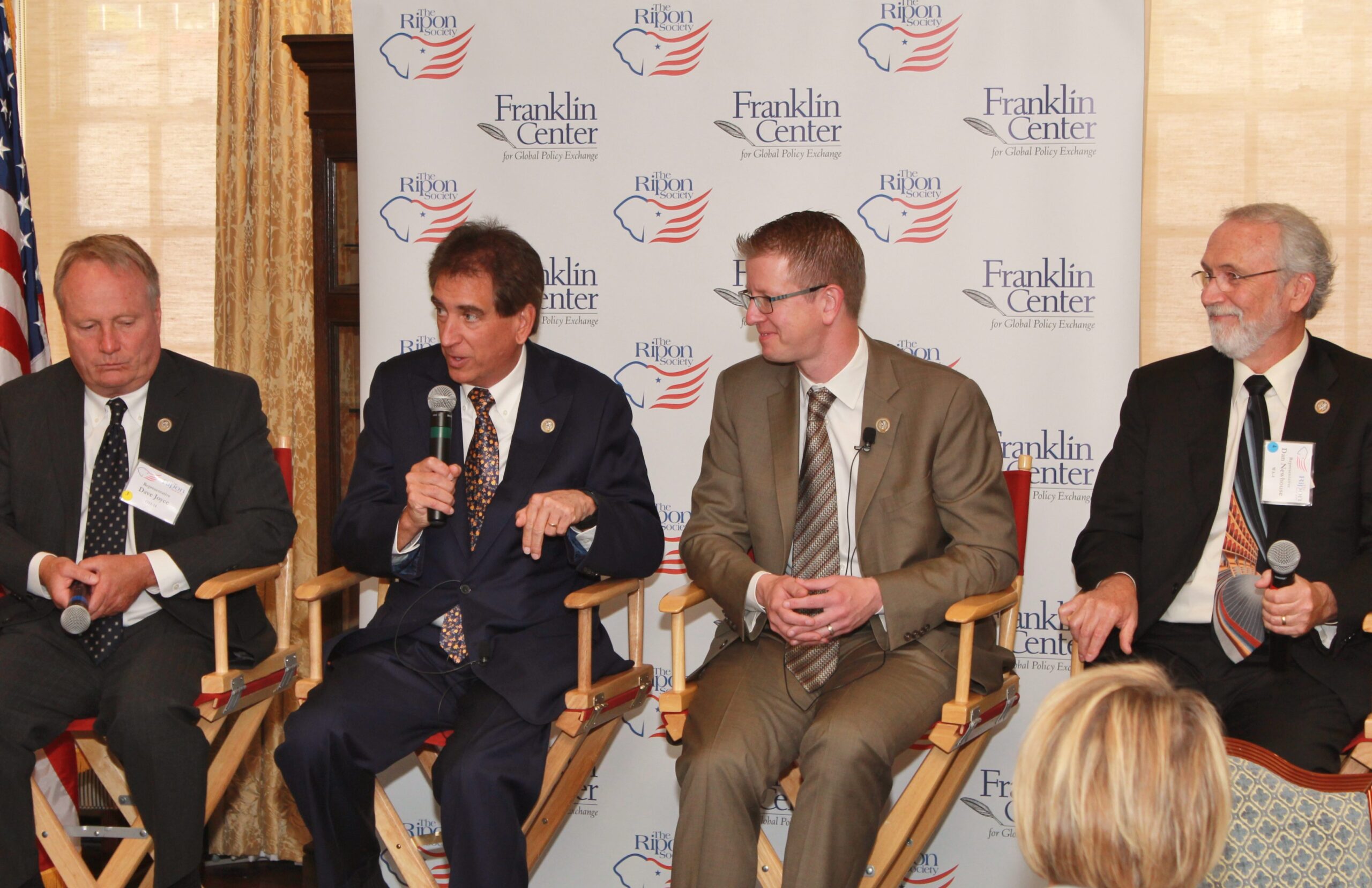 Bipartisan Working Group Seeks to Bridge Partisan Divide to Help America’s Heroes
Bipartisan Working Group Seeks to Bridge Partisan Divide to Help America’s Heroes
WASHINGTON, DC – The Ripon Society held a breakfast discussion yesterday morning with four members of the Bipartisan Working Group from the U.S. House of Representatives.
The focus of the discussion was intended to be the Group’s efforts to help America’s veterans on the eve of the national holiday which is dedicated to the freedoms that — through their military service and sacrifice – they helped to secure.
And while a significant part of the discussion was dedicated to the important subject of helping our heroes, a good bit of time was also spent talking about a problem that has often stood in the way of achieving this goal. The problem is partisan politics. It is why the Bipartisan Working Group was founded five years ago, and is a problem that Group’s members are working to overcome today.
The members taking part in yesterday’s discussion included U.S. Reps. Dan Newhouse (R/WA-4), Dave Joyce (R/OH-14), Derek Kilmer (D/WA-6), and Jim Renacci (R/OH-16). Renacci kicked off the discussion by recounting not only how he co-founded the Group in 2011 with former Democratic Representative John Carney, but how the Group has grown to a weekly breakfast meeting of over 25 Republicans and Democrats today.
“We try and talk about issues that we can work together on,” the Ohio Republican said, in explaining one of the Group’s main goals. “It’s sometimes thought of as the best hour of the week for most members because we have some very frank conversations. We talk about opportunities for ways we can work together. John Carney and I even had a bipartisan town hall one time — which is unheard of. He actually came back to Ohio, and he and I had a bipartisan town hall. People who showed up kept saying, ‘I’ve never seen anything like this.’ Even though we disagreed on issues, we were able to talk through them in front of people, and it made for a really good town hall.”
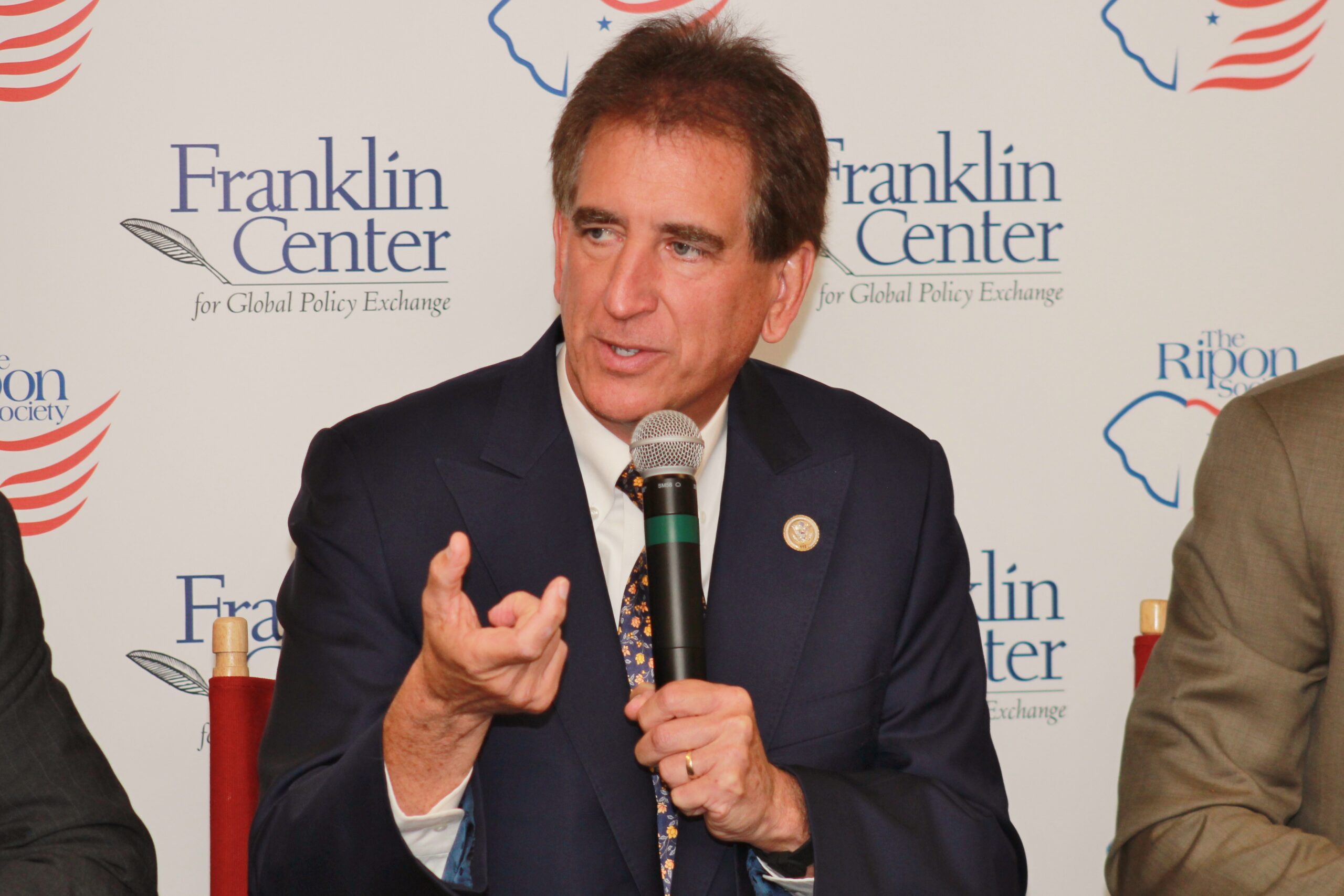
Renacci was elected to Congress in 2010 after a 30-year career in business that saw him own and operate over 60 entities and create over 1,500 jobs. He credits his experience in the private sector with his solutions-oriented approach to politics, and said it was one of the driving factors that led him to establish the Bipartisan Working Group shortly after he arrived in Washington.
He also credits Kilmer – who took over the Democratic reins of the Group after Carney was elected Governor of Delaware in 2016 — with sharing this same approach.
“Mr. Kilmer now is my co-chair, and he fits right in as somebody who wants to get things done,” Renacci stated. “He actually brought the General Accounting Office in several weeks ago to talk about veterans issues and areas where we could work together. We might have a lot of differences, but when it comes to veterans, we do unite. What we decided to do is move forward on veterans issues. We’re looking at putting a package together of bipartisan veteran issues.”
The package would address several key areas, including:
- Recruitment and retention of nurses;
- Facility alignment with the needs of veterans;
- Leading of Community Based Outpatient Clinics;
- Performance and oversight of the Veterans Crisis Line; and,
- Improving the VA’s organizational structure.
Renacci is working on the problem of nursing shortages, which he said stems in part from an application process that can be up to six months long.
“If you think about it,” he said, “there are nursing shortages all over the country and in other hospitals, as well. We’re not going to be able to put good, qualified nurses in the VA if we don’t simplify this process. And that’s what my bill does. It basically simplifies it and does some performance analysis to try and move things quicker. So these are simple issues, but they really do affect what we’re doing with our veterans. And I think that’s the key.”
Kilmer agreed.
“We have a CBOC in Bremerton, Washington that doesn’t meet its demand,” the Democratic lawmaker stated. “It’s in terrible, terrible condition, and they’ve literally gone through the process of trying to lease a new facility for more than three years. We looked into this, and interestingly enough, one of the GAO recommendations provided guidance to the VA on how to lease community based outpatient clinics. It was guidance that they are not following. So we have a bill that very simply says — follow that guidance. It’s not rocket science.”
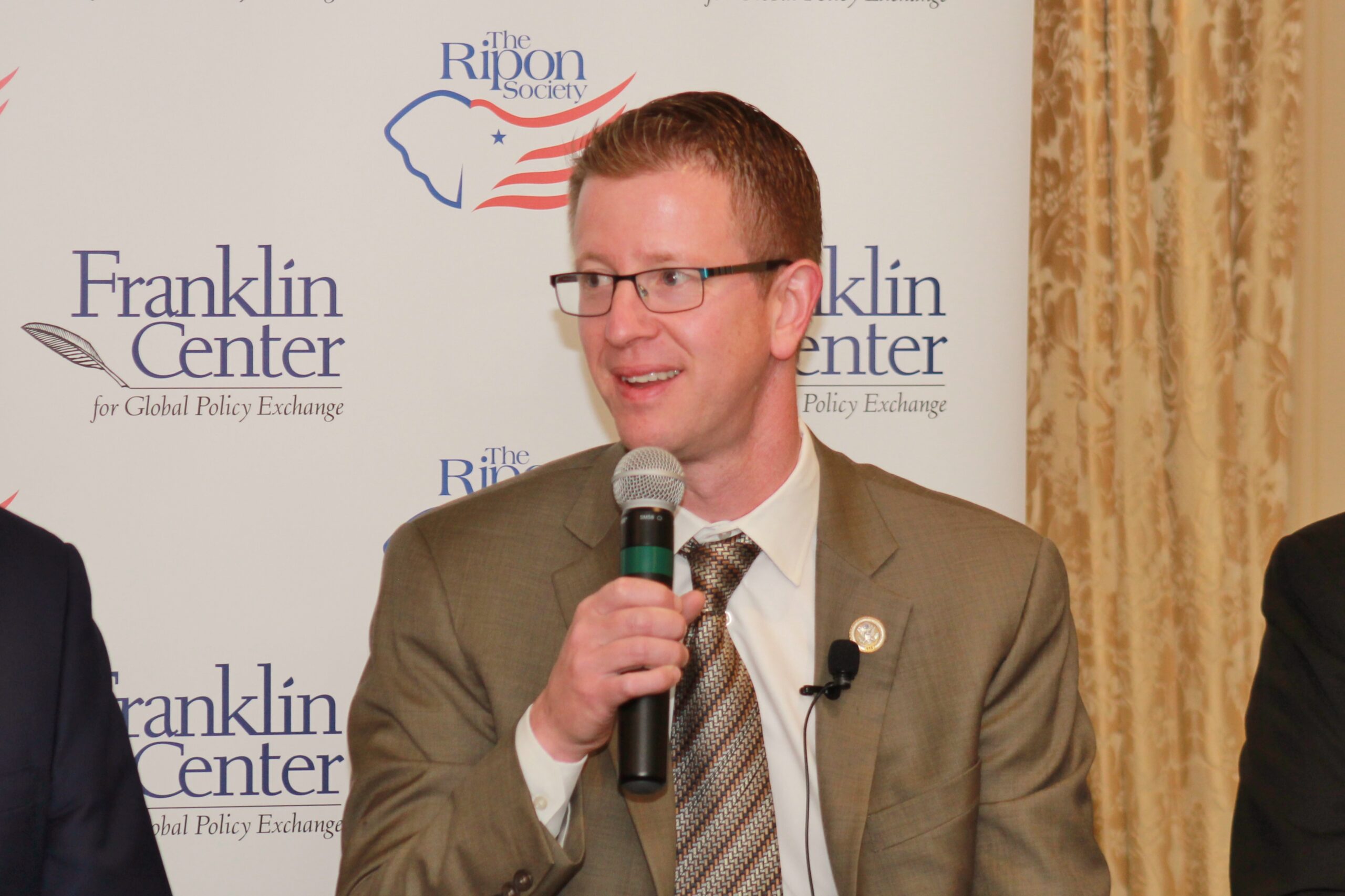
Kilmer was elected to Congress in 2012 after seven years of service in the Washington State House and Senate. While serving in the State Legislature, he was the principal writer of the state’s capital budget, and helped author a bipartisan infrastructure package that has been credited with creating 18,000 jobs. He also led a successful bipartisan effort in the Washington State Senate to balance the budget and reduce state debt.
“A healthy democracy is not dissimilar to a healthy marriage,” he said, returning to the subject of bipartisanship and his reason for joining the Group. “It doesn’t mean you agree all the time. But you have to be able to talk through stuff and not malign one another’s integrity or intent. I was invited to be a part of this group by John Carney. He came up to me after a meeting and said, ‘I like the way you engage people, with an eye trying to get some stuff done.” When I first got into public service there was a guy who I went to church with back home who was the Republican floor leader of our State House. He had then retired, and after I got elected into the State Legislature he took me out for coffee and said, ‘I have two words of advice for you. One — vote what you think is right. There are Democrats with good ideas and Democrats with bad ideas, and there are Republicans with good ideas and Republicans with bad ideas. Vote for the good ones and vote against the bad ones.’ It didn’t sound like rocket science to me, but it’s often missing in the political environment.
“The other thing he said was, ‘Try to get bipartisan support for your bills, because you’ll come up with better solutions.’ That’s the model that Jim and John Carney put together. To give you a sense of how we do these meetings, we start with initiatives, where each member gets an opportunity to talk about what they’re working on and invite bipartisan co-sponsorship of their bill; or if they have not yet introduced a bill, to invite partnership on bill development. We spend the second part of the meeting talking about what’s on the floor or any kind of big ticket items in Congress. Sometimes it’s challenging — things like health care and tax reform. And sometimes it’s less controversial. Then often times, we’ll have an outside speaker. As an example, we had the comptroller of the country come in and talk about our long term fiscal challenges. And that drove a bill that Jim is the lead on to create a new fiscal state of the nation address, so that we actually get some sense of our long term fiscal sustainability. I think every member of our group is a sponsor of that bill.”
Joyce echoed Kilmer’s remarks, and expanded even further on the veterans package the Group is putting together and what they are trying to do.
“Our bill is going to give the VA the ability to act in some areas where they don’t have the legal authority to do so,” he stated. “We’re going to give them that authority and make sure they start acting on things that are being found by the GAO or the IG.”
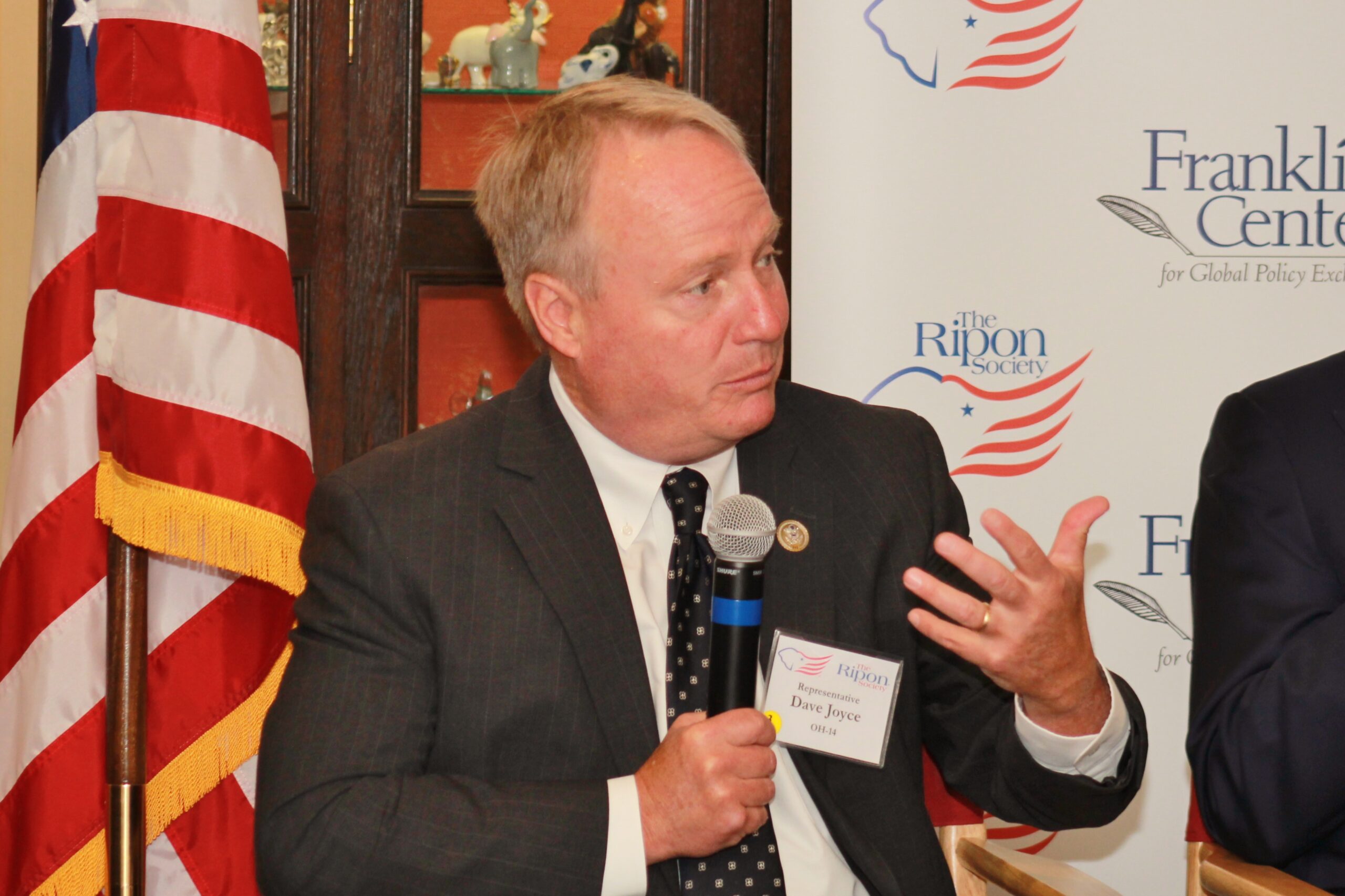
Joyce was elected to Congress in 2012 after a 25 year career as the Prosecutor for Geauga County, Ohio. In this position, he built a reputation as being a protector of both Geauga County families and Geauga County taxpayers. He also made it a priority to provide the highest quality work in the most cost-efficient manner possible. It is a goal that remains with him today, and one that he said all parts of the government should have, as well – including the VA.
“Last year, I went into one of the VA hospitals after they had all the problems in Phoenix,” he recounted. “I’m getting the white-glove tour of the place, and we finally get down to their office. I said, ‘Look, I didn’t bring any cameras here, and I’m not going outside and having a media event. What are the problems?’ They get down to it and say, ‘We get these people in and we can’t do this, we can’t do that.’ It wasn’t about money, and it’s still not about money. It’s a matter of having the ability to get the job done and implementing those things, having oversight that says that these things needs to be solved, and then having the ability to act out on them. And that’s what we’re trying to get accomplished through our act.”
Newhouse concurred, and opened his remarks by talking about the importance of working together on the issue, and how the lessons of bipartisanship were imparted on him as a young man.
“My father was in the state legislature for 34 years,” the Washington Representative stated. “He told me a lot of things, but one thing resonated very well with me. He told me that his best friend in the legislature was a Democrat. I couldn’t get my head around that for a while, because I thought it was one side versus the other. But if you know anything about politics in the state of Washington, I’m a Republican, and I was in the minority the whole time I was in the legislature. So I learned very early on that if I wanted to get anything accomplished, then I had to work with guys like Derek.
“I think that was, in my humble opinion, just tremendous preparation and training for coming to Washington, DC, which I think has maybe not been the epitome of bipartisanship. But we’re working closer to that, and that’s a really good thing. We have so many things to do that require those ideas from both sides. We’re not perfect at it. We have a long ways to go. But there are signs of improvement. The Bipartisan Working Group, which Derek first told me about when I was a freshman last term, sounded like this really exclusive group … I am very honored to be a part of it. And it truly is — as Jim said and others have echoed — the highlight of the week. It’s one place where labels don’t matter.
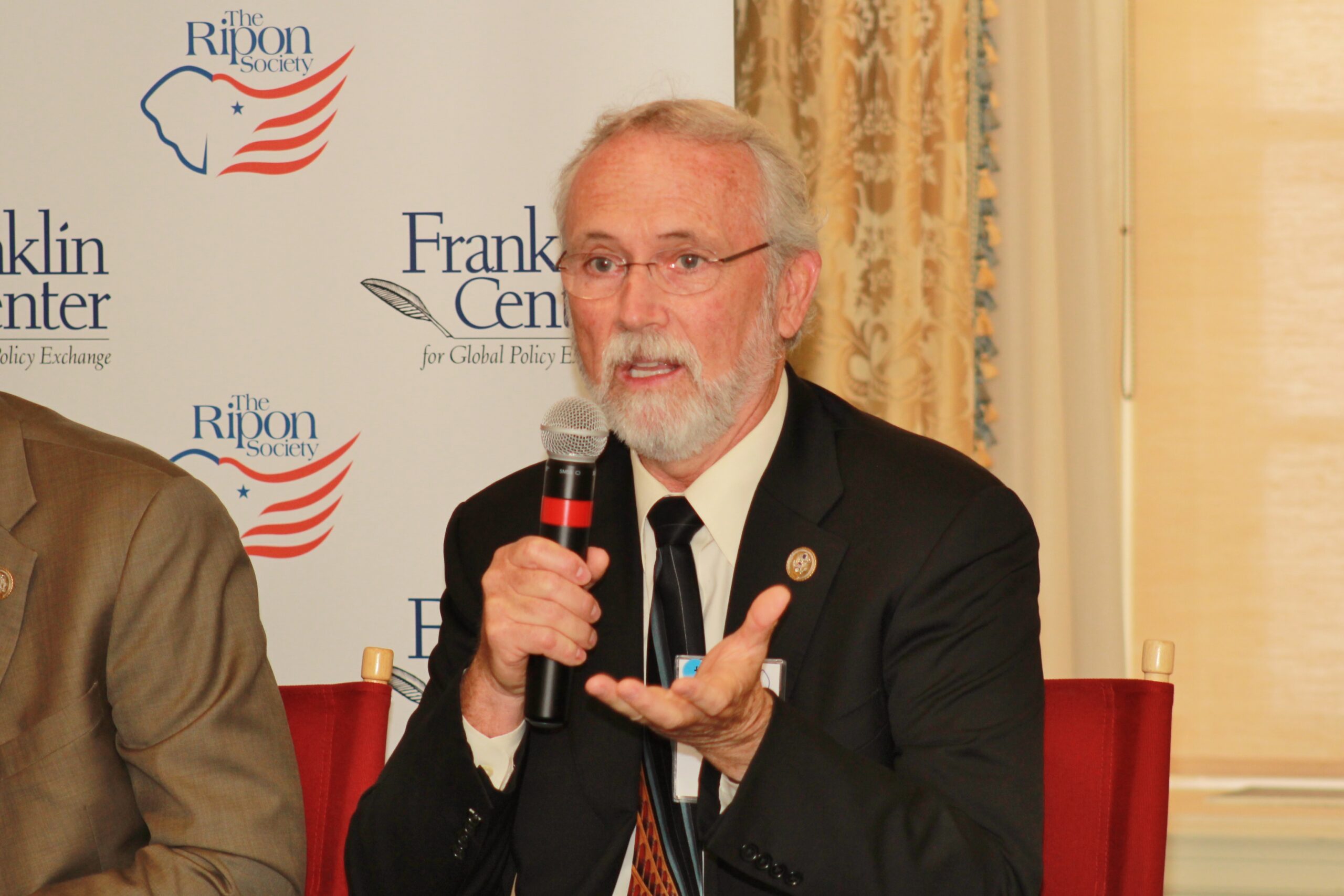
Newhouse was elected to Congress in 2014 after serving four terms in the Washington State House. A third-generation Yakima Valley farmer, he also spent four years as the Director of Washington State’s Department of Agriculture, where he listened to the concerns of farmers and promoted the state’s agricultural resources. He also promoted a virtue that has become all too rare in national politics today — the virtue of common sense.
“There’s a common theme to all these bills you’ve been hearing about,” he observed. “It’s simple stuff. Why do we have to legislate this? In the bill I’ve been working on with Derek, it is simply asking the VA to send Congress a report on how they can improve access to quality care for veterans. Why do we need to pass a law to say that? But we do. Part of that GAO report — part of the experience that all of us see in our Districts — points to the fact that it’s an issue that has to be overcome for our veterans to be able to get the care they need. I am very proud to be able to have a small part in improving access to care for our veterans, and I’m very happy to be here this morning.”
To view the remarks of Reps. Renacci, Kilmer, Joyce and Newhouse at The Ripon Society’s breakfast discussion yesterday morning, please click on the link below:
The Ripon Society is a public policy organization that was founded in 1962 and takes its name from the town where the Republican Party was born in 1854 – Ripon, Wisconsin. One of the main goals of The Ripon Society is to promote the ideas and principles that have made America great and contributed to the GOP’s success. These ideas include keeping our nation secure, keeping taxes low and having a federal government that is smaller, smarter and more accountable to the people.



